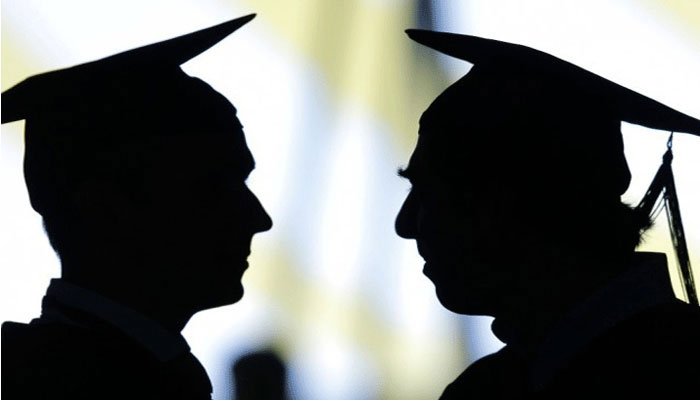Pakistan top recipient of EU-funded scholarships for third year
Islamabad:For the third year in a row, Pakistan has secured the most European Union-funded Erasmus Mundus Joint Masters scholarships globally - demonstrating its academic excellence and robust standing in the global education arena.
A total of 2,603 students from 137 countries have been selected for the programme this year to further their education in different fields, with Pakistanis leading in the number of scholarships awarded, according to spokesperson for the EU Mission in Islamabad Samar Saeed Akhtar.
"One hundred and eighty nine Pakistani students have been selected for the 2024 Erasmus Mundus scholarships. They include 100 men, 88 women, and one non-binary person," she told 'The News'.
Ms. Akhtar said that next on the scholarship list was India (146), followed by Mexico (121), Bangladesh (119), Nigeria (97), Brazil (84), Colombia (79), Spain (71), the United States and Indonesia (69), Egypt (68), the Philippines (63), China (55), Vietnam (54), and Kazakhstan (53).
She said that Pakistanis had claimed 192 Erasmus Mundus scholarships in 2023, 166 in 2022, 141 in 2021, 134 in 2020, 91 in 2019, 78 in 2018, and 46 in 2017. The EU Mission's spokesperson said that the selection process for the scholarships was highly competitive, and applications for the next programme would open in October 2024.
Under the programme, people selected from all over the world will study at several universities in Europe and beyond, with the best students being offered full scholarships covering participation costs and contributing to travel, visas, and living allowances.
The Erasmus Mundus Joint Masters are jointly designed and delivered by a group of higher education institutions and involve at least three institutions from at least three different countries and multiple associated partners from the academic and non-academic worlds. Usually, they include periods of study, research, trainee-ship, and thesis preparation and defence.
-
 'Elderly' Nanny Arrested By ICE Outside Employer's Home, Freed After Judge's Order
'Elderly' Nanny Arrested By ICE Outside Employer's Home, Freed After Judge's Order -
 Keke Palmer On Managing Growing Career With 2-year-old Son: 'It's A Lot'
Keke Palmer On Managing Growing Career With 2-year-old Son: 'It's A Lot' -
 Key Details From Germany's Multimillion-euro Heist Revealed
Key Details From Germany's Multimillion-euro Heist Revealed -
 David E. Kelley Breaks Vow To Cast Wife Michelle Pfeiffer In 'Margo's Got Money Troubles'
David E. Kelley Breaks Vow To Cast Wife Michelle Pfeiffer In 'Margo's Got Money Troubles' -
 AI-powered Police Robots To Fight Crime By 2028: Report
AI-powered Police Robots To Fight Crime By 2028: Report -
 Everything We Know About Jessie J's Breast Cancer Journey
Everything We Know About Jessie J's Breast Cancer Journey -
 Winter Olympics 2026: What To Watch In Men’s Hockey Today
Winter Olympics 2026: What To Watch In Men’s Hockey Today -
 Winnie Harlow Breaks Vitiligo Stereotypes: 'I'm Not A Sufferer'
Winnie Harlow Breaks Vitiligo Stereotypes: 'I'm Not A Sufferer' -
 Apple Martin Opens Up About Getting 'crazy' Lip Filler
Apple Martin Opens Up About Getting 'crazy' Lip Filler -
 Why Did OpenAI Remove One Crucial Word From Its Mission Statement?
Why Did OpenAI Remove One Crucial Word From Its Mission Statement? -
 Prince William Warned His Future Reign Will Be Affected By Andrew Scandal
Prince William Warned His Future Reign Will Be Affected By Andrew Scandal -
 Amy Madigan Reflects On Husband Ed Harris' Support After Oscar Nomination
Amy Madigan Reflects On Husband Ed Harris' Support After Oscar Nomination -
 Is Studying Medicine Useless? Elon Musk’s Claim That AI Will Outperform Surgeons Sparks Debate
Is Studying Medicine Useless? Elon Musk’s Claim That AI Will Outperform Surgeons Sparks Debate -
 Margot Robbie Gushes Over 'Wuthering Heights' Director: 'I'd Follow Her Anywhere'
Margot Robbie Gushes Over 'Wuthering Heights' Director: 'I'd Follow Her Anywhere' -
 'The Muppet Show' Star Miss Piggy Gives Fans THIS Advice
'The Muppet Show' Star Miss Piggy Gives Fans THIS Advice -
 Sarah Ferguson Concerned For Princess Eugenie, Beatrice Amid Epstein Scandal
Sarah Ferguson Concerned For Princess Eugenie, Beatrice Amid Epstein Scandal




